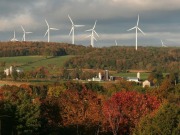
Renewable energy generation in 2012 was up by 20 percent on the previous year according to government figures, thereby confirming the strong performance of renewables within the wider UK energy network. 11.3 percent of the country’s electricity supply was generated by renewables last year and 12.5 percent in the fourth quarter.
Much of the growth in the sector has been achieved by new on and offshore wind farms in spite of lower than average wind speeds over the course of the year. 2012 was also fairly dry which acted to reduce the output from hydro, however biomass generation increased by 17 percent, thanks largely to Tilbury’s conversion to biomass, while solar PV capacity increased by 70 percent to 1.7GW. The total UK renewable energy power capacity now stands at 15.5GW.
“Renewables now generate more than 10% of our electricity on average” commented Gaynor Hartnell, CEO of the Renewable Energy Association (REA). “The conversion of Tilbury also shows what a big difference biomass can make, especially at a time when the Government is desperate to bring forward affordable, baseload, low carbon generation. It is a critical time for industry as the Energy Bill makes its way through Parliament. We look forward to working with Michael Fallon in his new role as Energy Minister, particularly in light of his work on the 2008 Planning and Energy Act, but a change of Ministers at this crucial time further complicates matters.”
There was a reduction in the consumption of liquid biofuels available for transport, down to 2.6 percent of UK motor fuel and this needs to be addressed in the policy framework in order for the biofuel sector to fulfil its potential within the wider context of decarbonising transport.
“These are trying times for producers of renewable transport fuels” Ms Hartnell said. “The removal of the fuel duty rebate for used cooking oil has significantly reduced biodiesel consumption, but the 5% cap on first generation biofuels proposed by the EU poses a much greater problem. We are pleased to hear that Ministers are prepared to be flexible on the level of the cap. The REA, alongside representatives of other land-based industries, will continue to call for greater use of genuinely sustainable biofuels.”
The REA anticipates modest growth in renewable heat capacity since the introduction of the Renewable Heat Incentive (RHI) but Ms Hartnell urged Ministers to ensure that there are no further delays to the introduction of the domestic RHI which will be crucial for raising awareness of renewable heat among consumers and boosting confidence in the industry.
Further information:

